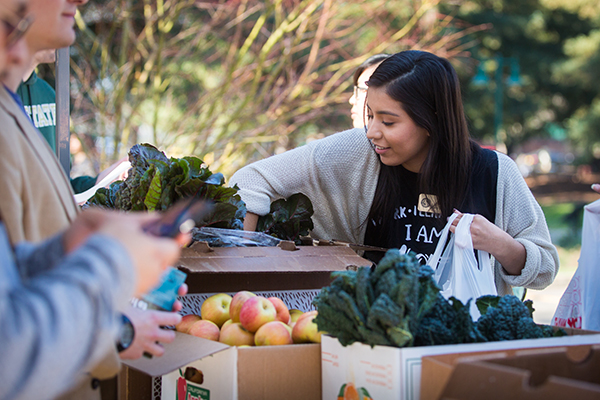 The Basic Needs Initiative Conference included a lunchtime pop-up pantry in the Library Quad, jointly sponsored by the CSU and Sacramento State's Associated Students Inc. (Sacramento State/Jessica Vernone) More photos
The Basic Needs Initiative Conference included a lunchtime pop-up pantry in the Library Quad, jointly sponsored by the CSU and Sacramento State's Associated Students Inc. (Sacramento State/Jessica Vernone) More photosNearly 11 percent of California State University (CSU) students admit to being homeless – sleeping in their car, on a friend’s couch, in a shelter, or outdoors – at least once last year, and 41.6 percent sometimes went hungry, with almost half describing their food security as low or very low.
These are among the results of a new study commissioned by the Chancellor's Office and revealed during the CSU Basic Needs Initiative Conference, Feb. 7-8 at Sacramento State’s Harper Alumni Center.
The CSU is the nation’s first public university system to research students’ food and housing insecurity with the goal of developing holistic solutions to help them succeed and graduate. The survey is the most comprehensive mixed-methods look at unmet basic needs and the relationship to student success ever conducted at a four-year university.
At Sacramento State, 12.6 percent of students who responded to the survey say they experience homelessness at some time in their college careers, and just over 47 percent struggle with food insecurity.
“I hope you know you’re doing sacred work,” President Robert S. Nelsen said in welcoming nearly 300 conference attendees from throughout the CSU. “What you’re doing to help students is so important. That all 23 campuses are represented here says something about the CSU and the heart within the system, that you care and that you make a difference.”
On Day 1 of the conference, Sacramento State debuted Epicure Extras, its latest effort to combat food insecurity. A push notification on the Sac State mobile app alerted students that food was available at the Alumni Center. More than 30 showed up with their OneCard and dined on tacos and fixings from the lunch buffet. More students responded to alerts for leftovers on Day 2.
Only 10 CSU campuses signal students when food remains from catered events. Epicure Extras is a partnership of University Enterprises, Inc. (UEI), Associated Students, Inc. (ASI), Student Affairs, Union WELL, Inc., and Information Resources and Technology (IRT).
“Epicure Extras helps students who have food insecurities get access to a snack or a meal, and it minimizes the food waste within our dining operations,” says Jim Reinhart, UEI executive director.
Also included during the conference was a lunchtime pop-up pantry in the Library Quad, jointly sponsored by the CSU and Sacramento State's ASI. Students were able to pick up fresh fruit and vegetables, as well as information about how to sign up for CalFresh.
The study released at the conference was the follow-up to the 2015 Phase 1 survey of staff, faculty, and administrators throughout the CSU that revealed approximately 8.7 percent of students were displaced and 21 percent struggled with food insecurity.
For the Phase 2 study, a survey was sent to all 484,000 CSU students; 24,537 responded. At Sacramento State, 1,814 of 30,510 students responded.
Among the latest findings across the CSU:
- Students who experienced food insecurity in the last 30 days or homelessness in the last year had lower grade-point averages than their more secure counterparts, and they suffered from anxiety, fear, fatigue, and suicidal feelings.
- Students who identified as black/African American and those who are first in their family to attend college experienced the highest rates of food insecurity (65.9 percent) and homelessness (18 percent.)
- CalFresh and campus emergency food-pantry use increased with students who reported low- and very low food security. However, utilization rates were very low at the time of data collection.
- The issue of housing instability is complex in that college students have many competing budgetary demands that usually are not covered by financial aid.
- As affordable housing becomes less available across California, students have fewer alternatives to high-market-value rental environments.
- The number of students who are food/housing insecure remains an estimate; the stigma of homelessness may cause students to hide their unstable housing status.
Cause for hope was revealed in the “Report on CSU Actions to Support Students Facing Food and Housing Insecurity,” a campus-by-campus breakdown of available basic needs services also released at the conference: All 23 campuses have food pantries or a food distribution programs, assist students with CalFresh applications, and connect students to much-needed services.
The report listed basic needs initiatives and programs in place at campuses throughout the system. Sacramento State offers the majority, including a case manager, a designated point of contact for basic needs resources, short-term emergency housing on campus, emergency grants and loans, and fundraising to support basic needs resources. The University also offers students free hygiene products, fresh produce, cooking classes, and professional clothing for job interviews and internships.
“We are proud to be a part of a university system that evidences such a passion and commitment to supporting the fundamental well-being of nearly a half-million students throughout California,” says Beth Lesen, Sac state's dean of students and assistant vice president for Student Affairs.
“The impact we’re making is remarkably inspiring. And as California’s capital university, it’s completely appropriate that Sacramento State would be a system-wide leader in these efforts.” – Dixie Reid
